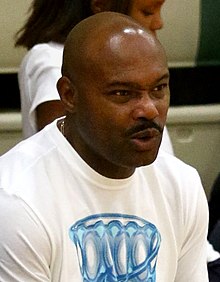
Alonzo Harding Mourning Jr. is an American former professional basketball player who has served as vice president of player programs and development for the Miami Heat since June 2009. Mourning played most of his 15-year National Basketball Association (NBA) career for the Heat.

Jason Frederick Kidd is an American professional basketball coach and former player who is the head coach for the Dallas Mavericks of the National Basketball Association (NBA). Widely regarded as one of the greatest point guards and passers of all time, Kidd was a 10-time NBA All-Star, a five-time All-NBA First Team member, and a nine-time NBA All-Defensive Team member. He won an NBA championship in 2011 as a member of the Dallas Mavericks and was a two-time gold medal winner in the Olympics with the U.S. national team in 2000 and 2008. He was inducted as a player into the Naismith Memorial Basketball Hall of Fame. In October 2021, Kidd was honored as one of the league's greatest players of all time by being named to the NBA 75th Anniversary Team.
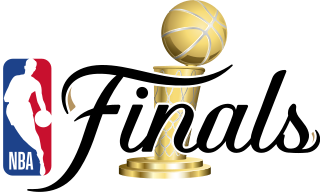
The NBA Finals is the annual championship series of the National Basketball Association (NBA). The Eastern and Western Conference champions play a best-of-seven-game series to determine the league champion. The team that wins the series is awarded the Larry O'Brien Championship Trophy, which replaced the original Walter A. Brown Trophy in 1977, though under the same name.
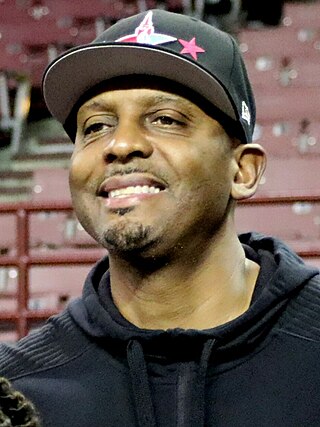
Anfernee Deon "Penny" Hardaway is an American college basketball coach and former professional player who is the head coach of the Memphis Tigers men's team in the American Athletic Conference (AAC). Hardaway played college basketball at Memphis and 14 seasons in the National Basketball Association (NBA), where he was a four-time NBA All-Star and a two-time All-NBA First Team member.
Jamal Mashburn Sr. is an American entrepreneur and former professional basketball player. Nicknamed "the Monster Mash", Mashburn was a prolific scorer as a small forward in his 12 seasons in the National Basketball Association (NBA), with a career scoring average of 19.1 points per game.
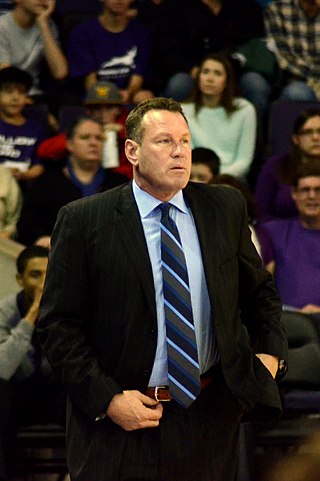
Daniel Lewis Majerle, also known by the nickname "Thunder Dan", is an American former professional basketball player and former coach of the Grand Canyon Antelopes. He played 14 years in the National Basketball Association (NBA) with the Phoenix Suns, Miami Heat, and Cleveland Cavaliers. He won a bronze medal with the U.S. national team at the 1988 Summer Olympics in Seoul, and a gold medal at the 1994 FIBA World Championship.

Donald Arvid Nelson is an American former professional basketball player and head coach. Nelson is second all-time in regular season wins of any coach in NBA history, with 1,335. He coached the Milwaukee Bucks, the New York Knicks, the Dallas Mavericks, and the Golden State Warriors. After an All-American career at the University of Iowa, Nelson won five NBA championships playing with the Boston Celtics, with his number 19 retired by the franchise in 1978.

Robert Allen McAdoo Jr. is an American former professional basketball player and coach. He played 14 seasons in the National Basketball Association (NBA), where he was a five-time NBA All-Star and named the NBA Most Valuable Player (MVP) in 1975. He won two NBA championships with the Los Angeles Lakers during their Showtime era in the 1980s. In 2000, McAdoo was inducted into the Naismith Basketball Hall of Fame. He was named to the NBA 75th Anniversary Team in 2021.
Voshon Kelan Lenard is an American former professional basketball player who played 11 seasons in the National Basketball Association (NBA). He was listed as 6' 4" and 215 lbs, and was born in Detroit, Michigan.

Collier "P. J." Brown Jr. is an American former professional basketball player who played in the National Basketball Association (NBA). The 6 ft 11 in (2.11 m), 239 lb (108 kg) center/power forward was selected out of Louisiana Tech University by the New Jersey Nets with the 29th overall pick in the 1992 NBA draft, but began his NBA career only in the 1993–94 season. He was voted into the NBA All-Defensive Second Team three times, in 1997, 1999 and 2001, and won the NBA Sportsmanship Award in 2004. He attended Winnfield Senior High School in Winnfield, Louisiana, where he played for the Winnfield Tigers, and has played professionally for the Nets, Miami Heat, Charlotte Hornets, New Orleans Hornets, Chicago Bulls and Boston Celtics. Brown retired from the NBA after winning an NBA championship with the Celtics in 2008.

Trevor Anthony Ariza is an American former professional basketball player, who spent 18 seasons in the National Basketball Association (NBA). He played college basketball for one season with the UCLA Bruins before being selected in the second round of the 2004 NBA draft by the New York Knicks. Ariza won an NBA championship with the Los Angeles Lakers in 2009. He also played for the Orlando Magic, Houston Rockets, New Orleans Hornets, Washington Wizards, Phoenix Suns, Sacramento Kings, Portland Trail Blazers, and Miami Heat.
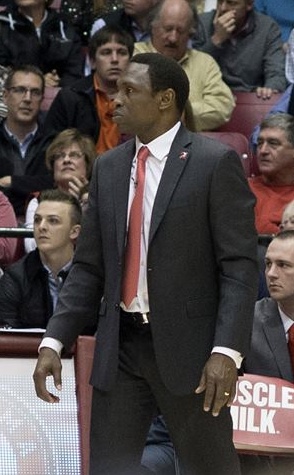
Avery DeWitt Johnson is an American basketball television commentator and former player and coach who most recently served as head coach of the Alabama Crimson Tide men's basketball team. He is currently an NBA and college basketball analyst for CBS Sports.
The 1996–97 NBA season was the ninth season for the Miami Heat in the National Basketball Association. During the off-season, the Heat signed free agents, All-Star guard and three-point specialist Dan Majerle, P.J. Brown, and Isaac Austin. The team also signed All-Star forward Juwan Howard to a 7-year $100 million contract, but was voided by the league claiming that Miami exceeded their salary cap; Howard then quickly re-signed with the Washington Bullets. At midseason, the team traded second-year guard Sasha Danilovic, and second-year forward Kurt Thomas to the Dallas Mavericks in exchange for Jamal Mashburn.
The 1999–2000 NBA season was the 12th season for the Miami Heat in the National Basketball Association. During the off-season, the Heat signed free agents Otis Thorpe, and undrafted rookie guard Anthony Carter. The Heat played the first two months of the season at the Miami Arena. They played their final home game at the Miami Arena on December 28, 1999 against the Minnesota Timberwolves, and then moved into the American Airlines Arena on January 2, 2000 against the Orlando Magic. The Heat got off to a 15–4 start, then later on holding a 30–17 record at the All-Star break. However, Tim Hardaway only played 52 games due to knee injuries, and Voshon Lenard was out for the remainder of the season with a lower abdominal strain after 53 games. At midseason, the team signed free agent Bruce Bowen. The Heat went on a 7-game winning streak between March and April, and finished first place in the Atlantic Division with a 52–30 record.
The 1998–99 NBA season was the 11th season for the Miami Heat in the National Basketball Association. On March 23, 1998, the owners of all 29 NBA teams voted 27–2 to reopen the league's collective bargaining agreement, seeking changes to the league's salary cap system, and a ceiling on individual player salaries. The National Basketball Players Association (NBPA) opposed to the owners' plan, and wanted raises for players who earned the league's minimum salary. After both sides failed to reach an agreement, the owners called for a lockout, which began on July 1, 1998, putting a hold on all team trades, free agent signings and training camp workouts, and cancelling many NBA regular season and preseason games. Due to the lockout, the NBA All-Star Game, which was scheduled to be played in Philadelphia, Pennsylvania on February 14, 1999, was also cancelled. However, on January 6, 1999, NBA commissioner David Stern, and NBPA director Billy Hunter finally reached an agreement to end the lockout. The deal was approved by both the players and owners, and was signed on January 20, ending the lockout after 204 days. The regular season began on February 5, and was cut short to just 50 games instead of the regular 82-game schedule.
The 1997–98 NBA season was the tenth season for the Miami Heat in the National Basketball Association. In the off-season, the Heat signed free agents Eric Murdock, three-point specialist Terry Mills, Todd Day, and acquired Duane Causwell from the Sacramento Kings. However, after only playing just five games for the Heat, Day was released to free agency after criticizing how head coach Pat Riley ran the team. Despite Alonzo Mourning missing the first 22 games of the season due to an off-season knee injury, and Jamal Mashburn only playing just 48 games due to a thumb injury, the Heat continued to play strong basketball as backup center Isaac Austin filled in the void as the team's starting center in Mourning's absence. Mourning would eventually return as Austin was traded at midseason to the Los Angeles Clippers in exchange for Brent Barry, as the Heat posted a 13–2 record in February, including a ten-game winning streak between February and March, and holding a 30–17 record at the All-Star break. The Heat finished first place in the Atlantic Division with a 55–27 record.

Timothy Duane Hardaway Jr. is an American professional basketball player for the Dallas Mavericks of the National Basketball Association (NBA). He played college basketball for the Michigan Wolverines and declared for the NBA draft after his junior season for the national runner-up 2012–13 team. Hardaway was selected with the 24th overall pick in the 2013 NBA draft by the New York Knicks. He has had two stints with the Knicks and has also played for the Atlanta Hawks. He is the son of Hall of Famer Tim Hardaway.
The 1996–97 NBA season was the Magic's eighth season in the National Basketball Association. After losing Shaquille O'Neal via free agency to the Los Angeles Lakers in the off-season, the Magic acquired Felton Spencer from the Utah Jazz, and signed free agents Gerald Wilkins, Derek Strong, and Danny Schayes. However, after playing just one game for the team, Spencer was then dealt along with Donald Royal and Jon Koncak to the Golden State Warriors in exchange for Rony Seikaly. Early into the season, the Magic played two games overseas against the New Jersey Nets in Tokyo, Japan. After an 8–4 start in November, the Magic struggled losing 10 of their 12 games in December, and held a 24–20 record at the All-Star break. The team lost five straight after the All-Star break, as head coach Brian Hill was fired 49 games into the season, and Penny Hardaway was generally blamed for leading a player revolt that resulted in his dismissal. Hill was replaced with assistant Richie Adubato for the remainder of the season, as the Magic finished third in the Atlantic Division with a 45–37 record.
The 2013 NBA playoffs was the postseason tournament of the National Basketball Association's 2012–13 season. The tournament concluded with the Eastern Conference champion Miami Heat defeating the Western Conference champion San Antonio Spurs 4 games to 3 in the NBA Finals. LeBron James was named NBA Finals MVP.

Run TMC was the high-scoring trio of Hall of Fame basketball teammates consisting of Tim Hardaway, Mitch Richmond and Chris Mullin. Starting in 1989, they played together for two seasons with the Golden State Warriors in the National Basketball Association (NBA). Coached by Don Nelson, who was also inducted into the Hall of Fame, the Warriors played a fast-paced, run-and-gun style, and Run TMC was the league's highest-scoring trio in the 1990–91 season. Despite their short time together, the popularity of Run TMC endured. Their name was a play on the hip hop group Run-DMC, with the first name initials of each member forming TMC.
